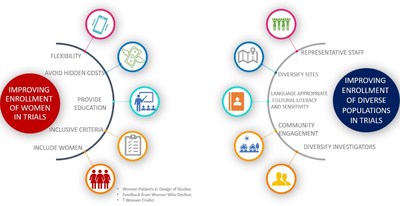The American Society for Preventive Cardiology (ASPC) has recently published a Clinical Practice Statement in the American Journal of Preventive Cardiology: Improving the Enrollment of Women and Racially/Ethnically Diverse Populations in Cardiovascular Clinical Trials.
|
JACKSONVILLE, Fla., Oct. 26, 2021 /PRNewswire/ -- The American Society for Preventive Cardiology (ASPC) has recently published a Clinical Practice Statement in the American Journal of Preventive Cardiology: Improving the Enrollment of Women and Racially/Ethnically Diverse Populations in Cardiovascular Clinical Trials. An ASPC working group was formed, chaired by Dr. Erin Michos and Dr. Keith Ferdinand, to provide an in-depth review of the literature covering the inclusion of women and racially/ethnically diverse backgrounds in cardiovascular clinical trials focusing on cardiovascular disease prevention, and to provide recommendations on best practices for improving enrollment diversity. Cardiovascular disease (CVD) remains the leading cause of death in men and women worldwide. Based on this review of the literature, both women and racially/ethnically diverse populations continue to be underrepresented in cardiovascular (CV) clinical trials. Diverse representation for clinical trials in CV drugs is vital for clinicians and researchers to be assured that the data reflects the diverse U.S. population. The ASPC Practice Statement identifies several factors as barriers for participation including, but not limited to fear, mistrust, unawareness of ongoing trials, restrictive eligibility criteria, comfort level, logistical challenges, and financial constraints. These barriers can be overcome by building trust with patient populations through community engagement, providing education on clinical trials, and diversifying the team of investigators on the trials. Authors recommend that going forward, NIH and industry-funded trials need to increase efforts to reach out to multiple communities and diverse communities. This effort will be needed to overcome the history of mistrust. Augmenting diversity in clinical trials will yield results that better reflect patient populations and will be especially important in studying diseases that disproportionately affect different patient populations. The full article can be found in the December issue of the American Journal of Preventive Cardiology: https://www.sciencedirect.com/science/article/pii/S2666667721001057 About the American Society for Preventive Cardiology About the American Journal of Preventive Cardiology
SOURCE The American Society for Preventive Cardiology |






